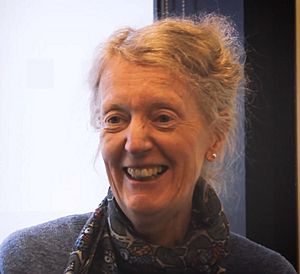Joanna Haigh facts for kids
Quick facts for kids
Joanna Haigh
|
|
|---|---|

Haigh interviewed by Carbon Brief in 2019
|
|
| Born |
Joanna Dorothy Haigh
7 May 1954 |
| Education | Hitchin Girls' School |
| Alma mater |
|
| Known for | Work on solar variability |
| Awards | Chree Medal (2004) |
| Scientific career | |
| Fields | Atmospheric physics |
| Institutions | |
| Thesis | Experiments with a two-dimensional model of the general circulation (1980) |
| Doctoral advisor | C.D. Walshaw |
| Notable students | Alice Larkin |
Joanna Dorothy Haigh is a British physicist and a respected academic. She was a Professor of Atmospheric Physics at Imperial College London until she retired in 2019. She also helped lead the Grantham Institute – Climate Change and Environment. Professor Haigh was once the head of the Physics Department at Imperial College London. She is a Fellow of the Royal Society, which is a very high honor for scientists. She also served as the president of the Royal Meteorological Society.
Contents
Early Life and Education
Joanna Haigh was born in 1954. She went to Hitchin Girls' School when she was younger. From an early age, she was very interested in the weather. As a teenager, she even built her own weather station in her backyard!
She studied physics at Oxford University. After that, she earned a Master of Science (MSc) degree in meteorology from Imperial College London. She then went back to Oxford to get her Doctor of Philosophy (DPhil) degree. This is the highest degree you can get in a field. Her special area of study was atmospheric physics, which is about the Earth's atmosphere. Her doctoral paper, finished in 1980, was about "Experiments with a two-dimensional model of the general circulation."
Career and Research
Joanna Haigh is now an Emeritus Professor of atmospheric physics at Imperial College London. This means she is retired but still highly respected by the university. From 2014, she was a co-director of the Grantham Institute – Climate Change and Environment. She also led the Department of Physics at Imperial College from 2009 to 2014.
Professor Haigh is well-known for her work on how the Sun's activity changes, called solar variability. She also studies how energy moves through the atmosphere (called radiative transfer). She looks at how different layers of the atmosphere, like the stratosphere and troposphere, interact. Her work also includes creating climate models, which are computer programs that help us understand and predict climate changes.
She was an editor for a science journal called Journal of the Atmospheric Sciences. She also helped write a major report for the Intergovernmental Panel on Climate Change (IPCC). The IPCC is a group that brings together scientists from all over the world to study climate change.
Understanding Climate Change
Professor Haigh agrees with most scientists that human activities, like releasing carbon dioxide into the air, cause the Earth to get warmer. This is known as the greenhouse effect. In 2016, she explained that if we keep releasing carbon dioxide at the same rate, the Earth's temperature could rise by 5 degrees Celsius by the end of the next century. She said that to stop the temperature from rising, we would need to completely stop releasing carbon into the atmosphere.
She felt hopeful after the COP21 conference in 2015, where many countries agreed to work on climate change. However, she later expressed concern about the future of climate action.
Awards and Honours
Joanna Haigh has received many important awards for her work. In 2013, she was made a Commander of the Order of the British Empire (CBE) for her contributions to physics.
She was the president of the Royal Meteorological Society from 2012 to 2014. She is currently a vice-president of the society. In 2013, she was chosen as a Fellow of the Royal Society (FRS). This honor recognized her leadership in understanding how the Sun affects the middle atmosphere. It also highlighted her work on how these effects can influence weather patterns closer to Earth. Her research helped create fast and accurate ways to model how energy moves in the atmosphere. These models are now used by climate scientists around the world.
In 2004, she received the Charles Chree Medal and Prize from the Institute of Physics. In 2010, she was awarded the Royal Meteorological Society Adrian Gill prize. Both awards recognized her important research on how the Sun's changes affect our climate.
In November 2020, she was included in the BBC Radio 4 Woman's Hour Power list. She was also interviewed about her life and work on the BBC Radio 4 show The Life Scientific in 2013.
Professor Haigh is also a Fellow of the Institute of Physics (FInstP).
 | Dorothy Vaughan |
 | Charles Henry Turner |
 | Hildrus Poindexter |
 | Henry Cecil McBay |

